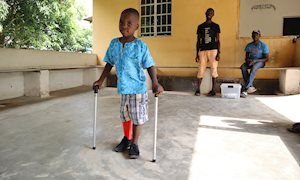31 January 2018
This was just one of the responses of the members of the Doctoral Examination Board during my PhD defense. Transferring the message that one of the most performed routine surgical procedures might not be better than conservative management led to a lively and interesting debate with the clinicians in the board. The underlying values and beliefs of this debate keep me motivated in my work as a researcher.
As a medical doctor I was struck by the lack of formal and comparative assessments of both existing as well as new evolving surgical procedures. In general, surgical progress had been a process of trial and error. Additionally, only scarce attention had been paid to societal inconvenience or cost. This has led to the current situation in which many routine surgical interventions are (known to be) not any better than conservative or placebo treatment. Only one example of such procedure is arthroscopic knee surgery in patients with knee pain and (incipient) knee osteoarthritis. This example is not an exception. Research programs such as the Dutch ZonMw’s Citrienfonds and the UK’s NICE “do-not-do” recommendations have identified a comprehensive amount of such lower value services.
Providing interesting food for thought, some people question whether there is a difference between carrying on doing such procedures and performing alternative medicine. Although sounding like a joke, it won’t make many surgeons laughing, and the answer might not be straightforward. Given that these procedures cause risk to patients, and cost to hospital (society), one may wonder why such procedures are still being performed, and contemplate on why it is apparently so difficult to de-implement ineffective and expensive procedures. Disinvestment and de-implementation is a science on its own, but a crucial one for the survival of our health-care system.
To prevent the need for de-implementation it would be better to rely on evidence based healthcare before proceeding to actual implementation. Hence, relying on the promotion of unbiased and reliable types of evidence before accepting and adopting new procedures. Next to evidence on effectiveness, deliberations on adoption should also take into consideration the additional cost associated with new procedures. Health care budgets are constrained, and we do not want to pay too much for our health insurance premium and “mandatory excess”. At the same time we want to get the best care. This implies that the given resources should be used for those procedures that maximize health gain and monetary value.
Implementing this paradigm within the surgical community is the focus of my research. As a researcher I am embedded in the section of evidence based surgery of the department of operating rooms (Prof. Maroeska Rovers). Being situated in proximity to the operating rooms facilitates the valuable (and requisite) collaboration with the surgeons. One part of our research is focused on developing and implementing methods that allow separating the wheat from the chaff out of the increasing flow of innovations as early as possible. We systematically assess whether or not an innovation has the potential to add value in day-to-day clinical practice, at affordable cost. Subsequently, we aim to efficiently boost the development & evaluation of those innovations that hold promise, and redirect innovations that do not hold promise. This approach ensures that innovation and evaluation evolve together in an ordered manner from concept, through exploration, to validation.
By our approach we strive to get the right innovation, in the skilled hands of the right surgeon, at the right patient, at the right time. Moreover, I hope that our collaborative approach will contribute to a change in view from 'If I do not offer this surgery to my patients, they will seek care elsewhere' to 'patients seek our care, because they can rely that we offer the best care'.

Jan Rongen
 Blog by Jan Rongen, MD PhD, researcher in the section of evidence based surgery of the department of operating rooms.
Blog by Jan Rongen, MD PhD, researcher in the section of evidence based surgery of the department of operating rooms.
This was just one of the responses of the members of the Doctoral Examination Board during my PhD defense. Transferring the message that one of the most performed routine surgical procedures might not be better than conservative management led to a lively and interesting debate with the clinicians in the board. The underlying values and beliefs of this debate keep me motivated in my work as a researcher.
As a medical doctor I was struck by the lack of formal and comparative assessments of both existing as well as new evolving surgical procedures. In general, surgical progress had been a process of trial and error. Additionally, only scarce attention had been paid to societal inconvenience or cost. This has led to the current situation in which many routine surgical interventions are (known to be) not any better than conservative or placebo treatment. Only one example of such procedure is arthroscopic knee surgery in patients with knee pain and (incipient) knee osteoarthritis. This example is not an exception. Research programs such as the Dutch ZonMw’s Citrienfonds and the UK’s NICE “do-not-do” recommendations have identified a comprehensive amount of such lower value services.
Providing interesting food for thought, some people question whether there is a difference between carrying on doing such procedures and performing alternative medicine. Although sounding like a joke, it won’t make many surgeons laughing, and the answer might not be straightforward. Given that these procedures cause risk to patients, and cost to hospital (society), one may wonder why such procedures are still being performed, and contemplate on why it is apparently so difficult to de-implement ineffective and expensive procedures. Disinvestment and de-implementation is a science on its own, but a crucial one for the survival of our health-care system.
To prevent the need for de-implementation it would be better to rely on evidence based healthcare before proceeding to actual implementation. Hence, relying on the promotion of unbiased and reliable types of evidence before accepting and adopting new procedures. Next to evidence on effectiveness, deliberations on adoption should also take into consideration the additional cost associated with new procedures. Health care budgets are constrained, and we do not want to pay too much for our health insurance premium and “mandatory excess”. At the same time we want to get the best care. This implies that the given resources should be used for those procedures that maximize health gain and monetary value.
Implementing this paradigm within the surgical community is the focus of my research. As a researcher I am embedded in the section of evidence based surgery of the department of operating rooms (Prof. Maroeska Rovers). Being situated in proximity to the operating rooms facilitates the valuable (and requisite) collaboration with the surgeons. One part of our research is focused on developing and implementing methods that allow separating the wheat from the chaff out of the increasing flow of innovations as early as possible. We systematically assess whether or not an innovation has the potential to add value in day-to-day clinical practice, at affordable cost. Subsequently, we aim to efficiently boost the development & evaluation of those innovations that hold promise, and redirect innovations that do not hold promise. This approach ensures that innovation and evaluation evolve together in an ordered manner from concept, through exploration, to validation.
By our approach we strive to get the right innovation, in the skilled hands of the right surgeon, at the right patient, at the right time. Moreover, I hope that our collaborative approach will contribute to a change in view from 'If I do not offer this surgery to my patients, they will seek care elsewhere' to 'patients seek our care, because they can rely that we offer the best care'.
Jan Rongen
Related news items

3D-printing prosthesis legs in the middle of the jungle a video call with our colleague Merel in Sierra Leone
14 December 2021 'They sometimes think I'm a sorceress,' says technical physician Merel van der Stelt, while she smiles. 'Take this lady without a lower leg. Yesterday she came here. We scanned her stump and today she already has a 3D printed prosthesis. With a prosthesis people count again'. go to page
Survey of patients to address knee pain from removed meniscus
19 November 2021 Patients with persistent knee pain after meniscus removal can participate at three locations in the Netherlands in the AIR2 study by ATRO Medical, a spin-off of the Radboudumc and DSM. go to page
Turbo Grants for four medical-technical research projects
19 October 2021 Four TURBO grants were recently awarded to new technical-medical research proposals. The grants are part of the TURBO program, a collaboration between the University of Twente (TechMed Centre) and the Radboudumc. go to page
Broken teeth coronastress poses a danger to our teeth
6 May 2021 Teeth grinding and molars on top of each other: stress from corona causes an increase in dental damage. That's what they noticed at the department of dentistry at Radboudumc. go to page
Intra-articular corticosteroid injections increase the risk of requiring knee arthroplasty
14 May 2020 In The Bone & Joint Journal, RIHS researcher Stan Wijn et al. showed that corticosteroid injections in the knee joint are associated with an increased risk of knee arthroplasty in patients with, or at risk of developing, symptomatic osteoarthritis of the knee. go to page